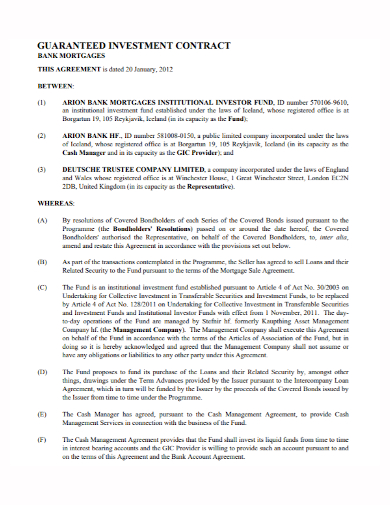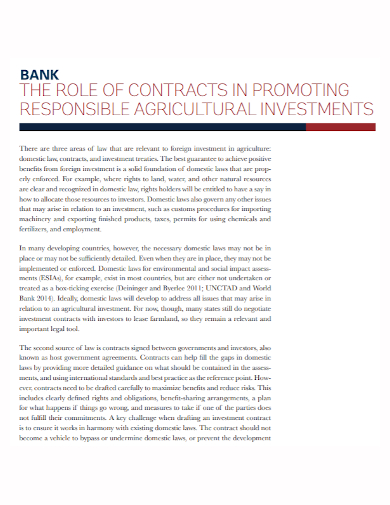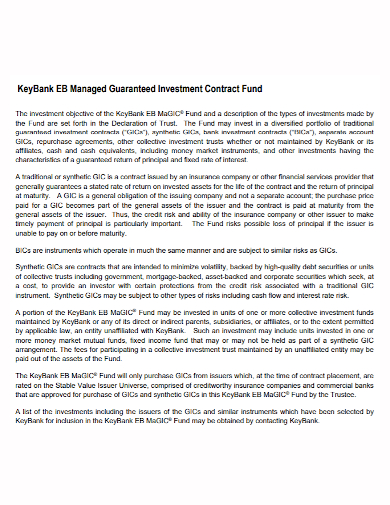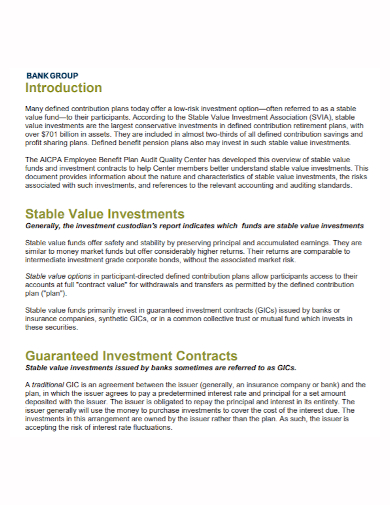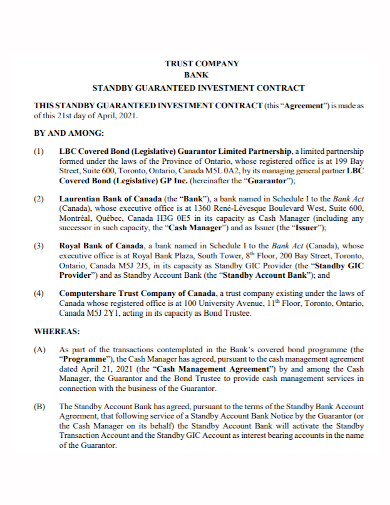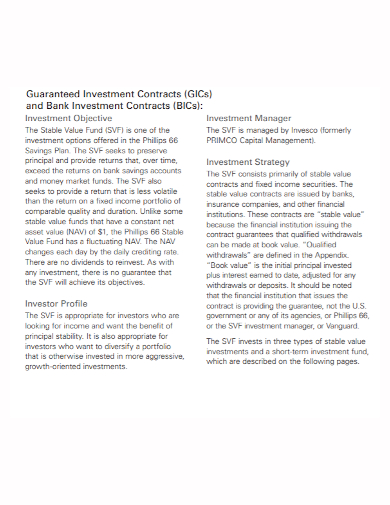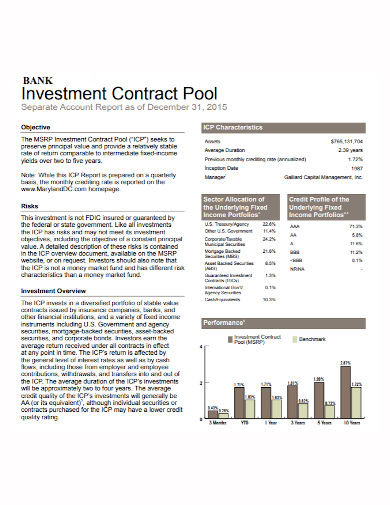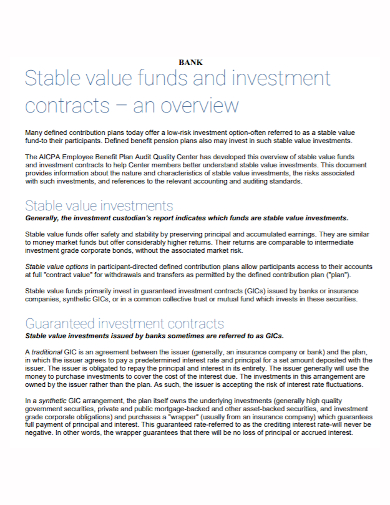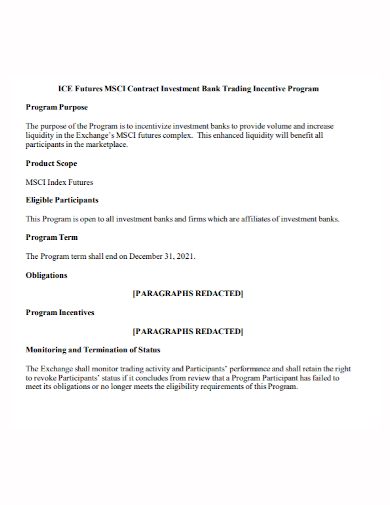You may need an investment contract as a small-business owner to bring in outside investors or to make routine investments in other businesses. An investment contract is a simple agreement that outlines the parameters of an investment as well as when and how the investor can anticipate a return. Many comparable clauses will be found in most simple investment contracts. The names and addresses of the parties, the main aim of the investment, the date the agreement is being formed, the basic structure of the investment, and the signatures of the relevant parties should all be included in an investment contract.
10+ Bank Investment Contract Samples
A bank investment contract (BIC), also known as a Bank Deposit Agreement, is a contract between a bank and an investor in which the bank guarantees a rate of return in exchange for the investor retaining a deposit for a set length of time (several months to several years). Guaranteed investment contracts (GICs) are similar to BICs, however, GICs are issued by insurance firms, whereas BICs are issued by banks. The issuer (the bank) guarantees the return of the investor’s money and pays a set or variable rate of interest until the contract expires. Meanwhile, the bank tries to gain a bigger return on the investment than the investor has committed to pay.
1. Bank Investment Contract Template
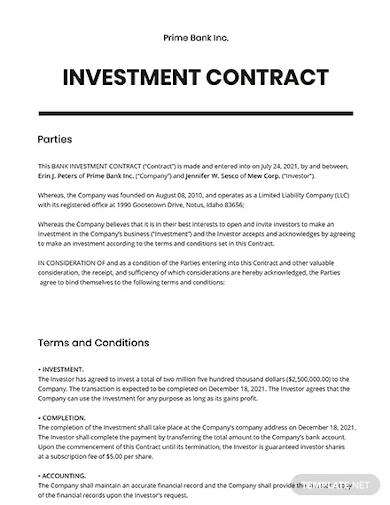
2. Bank Investment Contract Summary
3. Bank Mortgage Investment Contract
4. Agriculture Bank Investment Contract
5. Bank Investment Fund Contract
6. Bank Group Investment Contract
7. Company Bank Investment Contract
8. Guaranteed Bank Investment Contract
9. Bank Account Investment Contract
10. Bank Value Investment Contract
11. Bank Program Investment Contract
Understanding Bank Investment Contract
Guaranteed investment contracts (GICs), which are provided by insurance firms, are comparable to bank investment contracts. Despite the fact that these contracts typically contain low-risk securities, they are extremely illiquid, meaning they cannot be easily sold or exchanged for cash. Investors who purchase these contracts are typically expected to keep the funds invested for the term of the contract.
BICs have the advantage that, unlike certificates of deposit (CDs), they generally allow for further incremental contributions, all of which earn the same guaranteed rate.
Advantage of Bank Investment Contract
BICs are secured by the assets of the issuing bank or financial organization. BICs are widely used by pension plans as part of a diversified portfolio that comprises a mix of low-, medium-, and high-risk investments. BIC investors get a guaranteed rate of return that tries to beat fixed-income investments like CDs, savings accounts, and Treasury notes. Other benefits of BICs include the possibility for investors to invest over time rather than in a single lump sum. Many BICs include a few-month deposit window during which the investor can invest in the BIC and get the guaranteed interest rate for the length of the contract.
The disadvantage of Bank Investment Contract
BICs have a number of drawbacks that make them less appealing to some investors. Interest rate risk, inflation risk, and liquidity risk are the three main risks that BICs face. Even if interest rates climb throughout the holding period, the BIC investor will only get the lesser rate set in their contract. Increased inflation reduces the purchasing power of a BIC, lowering its returns. Because BICs are illiquid, they can’t be sold on the secondary market if the investor needs cash immediately. BICs are neither FDIC-insured nor backed by the government. If the issuing bank or financial institution fails to meet its obligations to investors, a BIC holder may lose money.
FAQs
Why does bank investment contracts matter?
Interest rate risk and liquidity risk are the two most significant concerns associated with BICs. When interest rates fall, there may be more BIC investments available than the bank can financially invest. When interest rates rise, there may be fewer investments and more withdrawals, forcing the bank to keep a large portion of its money liquid. BICs with fixed rates are also susceptible to inflation. These hazards raise the bank’s overall risk, which is why bank examiners scrutinize BIC funding as well as bank rules and practices connected to BIC activity.
What is a characteristic of a good investment contract?
A proper investment contract will spell out how much the investor must contribute when the money must be transferred, and what type of investment it is. The majority of investments will be made in cash, via check, or by wire transfer. Some investments, on the other hand, may take the shape of tangible assets. This should be included in your contract. If the investor is providing actual assets to the business, you should consider how you will continue to operate if the investor requests that the assets be returned.
If you want to see more samples and formats, check out some bank investment contract samples and templates provided in the article for your reference.
Related Posts
Sample Excuse Letter for School
Feature Writing Samples
FREE 10+ Security Guard Contract Samples in PDF | MS Word
FREE 10+ Option to Purchase Agreement Samples in MS Word | Apple Pages | PDF
FREE 26+ Curriculum Form Samples in MS Word | PDF
FREE 20+ Cleaning Service Proposal Samples in PDF | MS Word
FREE 29+ Sample Loan Application Form Templates in MS Word | PDF
FREE 10+ Event Venue Contract Samples in PDF | MS Word | Pages | Google Docs
FREE 10+ SBAR Samples in PDF | DOC
FREE 12+ Music Band Contract Templates in PDF | MS Word
FREE 10+ HVAC Maintenance Contract Samples in PDF | MS Word
FREE 10+ Social Media Marketing Contract Samples in MS Word | PDF
FREE 10+ Wholesale Assignment Contract Samples in PDF
FREE 18+ Financial Proposal Samples in PDF | MS Word | Google Docs | Pages
FREE 10+ Feasibility Study Samples in PDF


